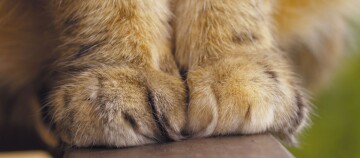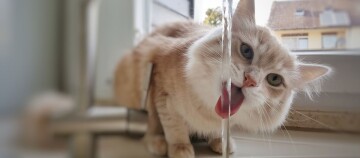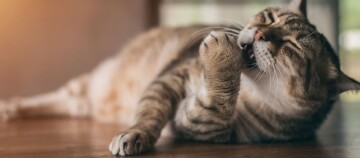Constipated cat – the symptoms, causes and remedies
21.12.2023 - Reading time: 8 minutes

Constipation in a cat can have various causes. It is important to recognise the symptoms and know what to do.
Cat constipation often goes unnoticed when small felines go outside. When a cat has been constipated for several days, its owner may notice that its little companion has a swollen belly and is unusually tired. Keep your cat in the house if you think they are suffering from constipation. You’ll be able to see if they are using their litter tray and if any other symptoms appear.
How can I tell if my cat is constipated?
The main symptoms of constipation in cats are as follows:
- The cat goes to its litter tray often but fails to have a bowel movement
- The amount of stools in the litter is minimal
- The stools are hard, dry and small
- They are in pain and mew when they need to open their bowels
You may also find blood in the stools and your cat may lose their appetite and vomit. A cat that used to be toilet trained may now make a few small droppings outside its litter tray. A vet will recognise the symptoms that indicate whether the constipation is temporary, chronic or even a faecal impaction. Sometimes a scan of your cat’s abdomen will be necessary to make the diagnosis and decide on the treatment to be given.
Cat constipation – When to worry?
As in humans, certain foods are not digested as well by cats and can lead to mild constipation lasting a day or two. If your little four-legged friend still hasn’t managed to open their bowels after 48 hours, it’s best to consult your vet. It’s even more urgent if your cat has a fever, vomits, spends all their time sleeping and eats almost nothing. There are numerous causes of constipation in cats and it can be a sign of illness. Be sure to check whether your male cat is urinating. Frequent trips back and forth to the litter tray sometimes give the impression that a cat is constipated when it is actually trying to urinate. In this case too, you should call your veterinary clinic immediately. A urinary obstruction can be fatal.
Why is my cat constipated?
There are various reasons for constipation in cats:
- Lack of activity: a house cat is more at risk of being constipated than a cat that goes out.
- A diet that is not suitable for it: to support digestion, your cat’s food should contain enough fibre.
- A change of diet: your cat’s digestive system may react to this by causing constipation. It’s better to change the diet gradually.
- Hairballs: cats are clean animals that lick themselves clean. For cats with long fur, hairballs mixed with faeces slow down digestion.
- Dehydration: a dehydrated cat will have drier stools. In hot weather, offer your little companion wet food and make sure they always have water available.
- The litter tray: cats don’t do their business just anywhere. You may have put their cat toilet somewhere they don’t like. When several cats live under the same roof, you need to provide them with several litter trays. Otherwise, one of them may hold back from opening their bowels.
- Stress: as in humans, digestive troubles can be linked to stress, for example moving house, a new animal in the house, the birth of a baby, etc.
- Illness: feline dysautonomia, intestinal tumour, renal failure, etc.
Constipated cat – What to do?
If your cat has been constipated for less than two days and seems well, you can try to help them by adding fibre to their food. Simply cook some broccoli or courgette and add it their food. Malt- or paraffin-based food supplements have a laxative effect that helps eliminate hard stools. Some cat foods are designed to aid digestion. They are also suitable in the long term for cats suffering from chronic constipation. If your cat eats biscuits, leave them to soak in lukewarm water to hydrate your pet. When a cat has been constipated for 3 days, you should consult a vet in order to avoid complications. Constipation is generally easy to treat when it first occurs. The longer you wait, the more difficult it will be to treat and the more the risk of chronic constipation increases. The regular accumulation of faeces in the colon causes it to dilate and what is known as megacolon can develop. The cat then finds itself in a vicious circle, which it will not overcome without treatment. An X-ray or ultrasound is not always necessary for the vet to detect megacolon. Abdominal palpation will suffice to feel the mass of hard stool in the colon. Your vet will prescribe short-term and long-term treatment to ensure that this does not happen again once the stools have been passed.
Constipated cat – massage reduces stress
A cat that is constipated does not feel well, which can lead to stress and increased digestion problems. To help your little furball relax, massage them daily for ten minutes. Do not force them to be massaged, as this will have the opposite effect. Choose the right moment, perhaps when your little feline usually comes up to you to be petted on the sofa. The calmer and more relaxed you are, the more your cat will want to lie on your lap and let you massage them. Massaging a cat is not the same as massaging a human. A cat’s skin is very sensitive and if you press too hard, you risk hurting it. Get your cat used to massage gradually and see how they react. If they seem to like what you’re doing, you may continue. If they are fidgeting or wagging their tail, it’s best to stop. Perhaps it’s not the right time or your cat is simply not a fan of massage. Try again later. Start the massage on a part of your cat’s body where they like to be stroked. Play relaxing cat music. Gently massage their head, forehead, ears and chin. If they start purring, you’re on the right track.
Cat constipation – natural remedy
A home remedy may provide improvement for cat constipation at a lower cost. Here are a few natural remedies for constipated cats:
- Get your cat to move more by playing with them and giving them toys that encourage them to exercise.
- Grow catnip for your little feline, especially if they don’t go outside. It purifies the digestive system and is rich in vitamins. If you have several felines, there should be enough catnip for them all. Plant a few pots and place them in different parts of your home.
- High-quality extra virgin olive oil is packed with benefits for both humans and cats. It helps digestion. As cats like the taste of it, simply add a little to their food.
- Fibre-rich green vegetables such as courgette are known to remedy temporary constipation. Cook it and add it to their usual food. If your cat refuses to eat it, try another vegetable such as broccoli.
- Psyllium is a medicinal plant that has been used since ancient times to treat constipation. Some food supplements for cats contain it. Seek your vet’s advice before using psyllium for your little furball. Certain health problems are contraindicated.
- Daily brushing of long-haired cats such as Persians or Sacred Birmans reduces the risk of hairball ingestion. This is particularly important during moulting season in autumn and spring.
- Offer your older cat a diet adapted to its senior needs to avoid constipation, which is more common in older cats.
- An unweaned, orphaned kitten needs help to open its bowels. Usually its mother would take care of this. You should therefore take its place by gently rubbing the kitten’s lower belly with a cloth dampened with lukewarm water. If you don’t do that, the baby cat will not be able to urinate or open its bowels.
Causes of constipation in cats can be so varied that self-medication is strongly advised against and may even be dangerous for your pet. So do not hesitate to visit your veterinary clinic if your cat has been constipated for more than three days. That way you’ll know what’s really wrong and whether it’s serious or not. More often than not, a change in diet is enough to fix the problem, but sometimes medication and even surgical intervention are the only way to save your cat or prolong their life.



